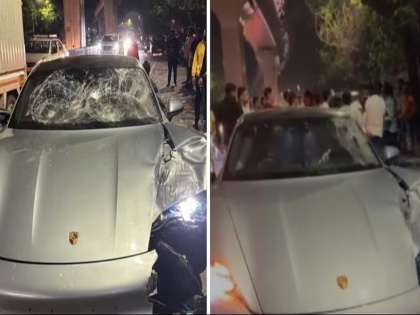Pune Porsche Accident: Minor Accused Sent to 15-Day Rehab Home; How Does the Juvenile Justice Act Work for Section 304?
By sahir shaikh | Published: May 23, 2024 06:00 PM2024-05-23T18:00:01+5:302024-05-23T18:01:11+5:30
The Pune Porsche accident case which involved an 17 years 8 months old son of a renowned builder in ...

Pune Porsche Accident: Minor Accused Sent to 15-Day Rehab Home; How Does the Juvenile Justice Act Work for Section 304?
The Pune Porsche accident case which involved an 17 years 8 months old son of a renowned builder in Pune and killed two IT professionals was sent to an observation home by the Juvenile Justice Board. The order was declared late in the evening on May 22.
The Pune City Police had charged the Child-in-Conflict with the law with sections 304 (culpable homicide not amounting to murder), 304 A (causing death by negligence), 279 (rash driving ), 337 (causing hurt by an act which endangers human life), 338 (causing grievous hurt by an act endangering life or personal safety) and relevant sections of the Motor Vehicles Act and accordingly an FIR was filed at the Yerwada police station.
The court had earlier granted a conditional bail to the CCL and after a huge public, the police filed a review application against the bail and requested the court to grant the adult status to the CCL as the crime was heinous. The Juvenile Court however keeping intact the rights of the CCL denied the Pune police application to treat him as an adult and the demand of Police Custody however denied his bail.
Advocate Prashant Patil who represented the CCL argued at length and gave a reference to a judgement given by the Supreme Court of India where he said the review application filed by the Pune Police is not maintainable under section 104 of the Juvenile Justice Act. Section 104 of the J.J. Act, 2015 prescribes a procedure before an order already passed can be amended. It says that “all persons concerned” or their authorized representatives shall be heard by the committee before such an order is amended.
Advocate Prashant Patil stated that the entire JJ. The act has been drafted keeping the safety and atmosphere child at the centre. The entire process of granting an adult status to the CCL takes more than three months, once a CCL has been detained and an FIR has been filed a chargesheet has to be filed within 30 days. Which does not require the CCL to stay in detention for even a single day. Within two months, the reports filed by the physiatrist and the social behavioural agencies in these two months decided whether the CCL should be granted adult status.
Advocate Yashpal Purohit panel advocate while talking to LikmatTimes.com said, “ There is a procedure that needs to be followed before granting the adult status to the CCL. There are certain contributing factors where the intent of the CCL is also examined. There were amendments made by the Honourable Supreme Court after the Nirbhaya Case. In the Kalyaninagar accident case, the judgement given by the Honourable Juvenile Court also states the same thing.”
Law for juveniles charged with Section 304 IPC
The accused under the age of 18 is considered a juvenile and tried under the Juvenile Justice (Care and Protection of Children) Act or JJ Act, 2000. This changed with the Juvenile Justice (Care and Protection of Children) Act, 2015. The amendments in the law after the Nirbhaya created a category of juvenile accused aged between 16 and 18 involved in heinous crimes with a minimum sentence under the IPC or any other law for over seven years.
Open in app